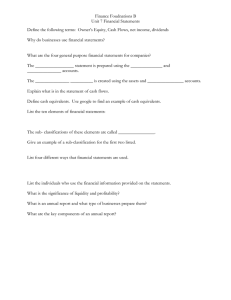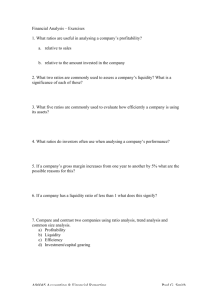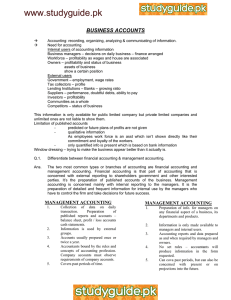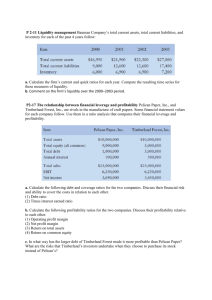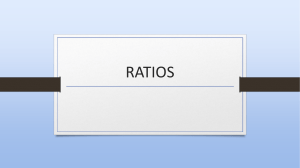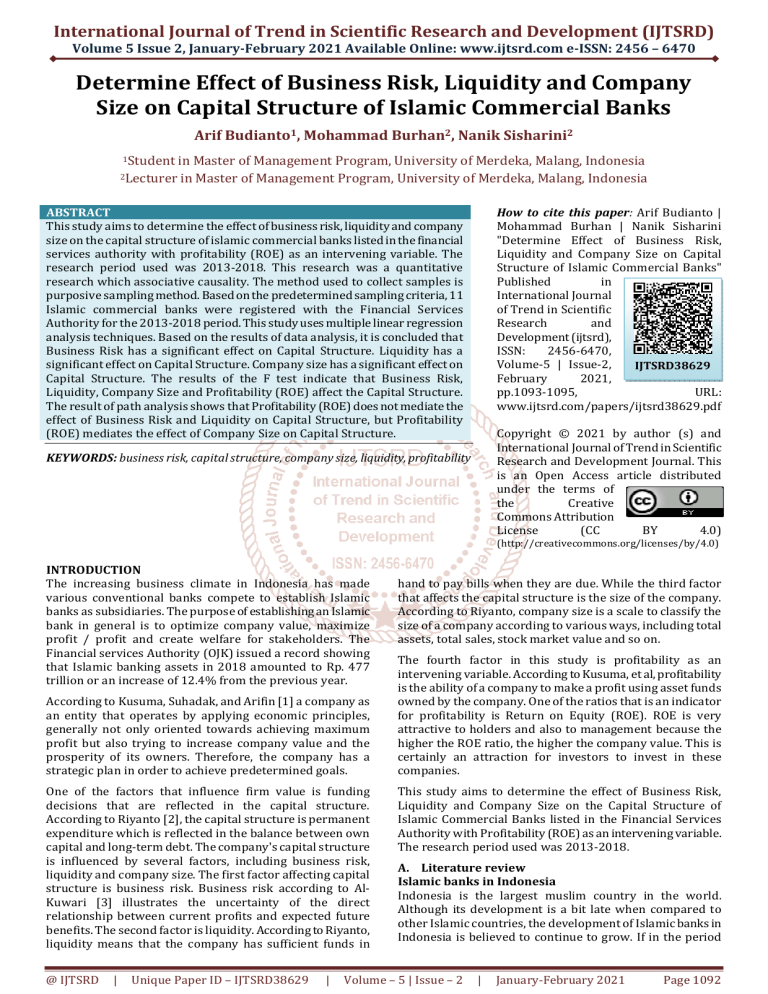
International Journal of Trend in Scientific Research and Development (IJTSRD)
Volume 5 Issue 2, January-February 2021 Available Online: www.ijtsrd.com e-ISSN: 2456 – 6470
Determine Effect of Business Risk, Liquidity and Company
Size on Capital Structure of Islamic Commercial Banks
Arif Budianto1, Mohammad Burhan2, Nanik Sisharini2
1Student
in Master of Management Program, University of Merdeka, Malang, Indonesia
2Lecturer in Master of Management Program, University of Merdeka, Malang, Indonesia
ABSTRACT
This study aims to determine the effect of business risk, liquidity and company
size on the capital structure of islamic commercial banks listed in the financial
services authority with profitability (ROE) as an intervening variable. The
research period used was 2013-2018. This research was a quantitative
research which associative causality. The method used to collect samples is
purposive sampling method. Based on the predetermined sampling criteria, 11
Islamic commercial banks were registered with the Financial Services
Authority for the 2013-2018 period. This study uses multiple linear regression
analysis techniques. Based on the results of data analysis, it is concluded that
Business Risk has a significant effect on Capital Structure. Liquidity has a
significant effect on Capital Structure. Company size has a significant effect on
Capital Structure. The results of the F test indicate that Business Risk,
Liquidity, Company Size and Profitability (ROE) affect the Capital Structure.
The result of path analysis shows that Profitability (ROE) does not mediate the
effect of Business Risk and Liquidity on Capital Structure, but Profitability
(ROE) mediates the effect of Company Size on Capital Structure.
How to cite this paper: Arif Budianto |
Mohammad Burhan | Nanik Sisharini
"Determine Effect of Business Risk,
Liquidity and Company Size on Capital
Structure of Islamic Commercial Banks"
Published
in
International Journal
of Trend in Scientific
Research
and
Development (ijtsrd),
ISSN:
2456-6470,
Volume-5 | Issue-2,
IJTSRD38629
February
2021,
pp.1093-1095,
URL:
www.ijtsrd.com/papers/ijtsrd38629.pdf
Copyright © 2021 by author (s) and
International Journal of Trend in Scientific
Research and Development Journal. This
is an Open Access article distributed
under the terms of
the
Creative
Commons Attribution
License
(CC
BY
4.0)
KEYWORDS: business risk, capital structure, company size, liquidity, profitability
(http://creativecommons.org/licenses/by/4.0)
INTRODUCTION
The increasing business climate in Indonesia has made
various conventional banks compete to establish Islamic
banks as subsidiaries. The purpose of establishing an Islamic
bank in general is to optimize company value, maximize
profit / profit and create welfare for stakeholders. The
Financial services Authority (OJK) issued a record showing
that Islamic banking assets in 2018 amounted to Rp. 477
trillion or an increase of 12.4% from the previous year.
According to Kusuma, Suhadak, and Arifin [1] a company as
an entity that operates by applying economic principles,
generally not only oriented towards achieving maximum
profit but also trying to increase company value and the
prosperity of its owners. Therefore, the company has a
strategic plan in order to achieve predetermined goals.
One of the factors that influence firm value is funding
decisions that are reflected in the capital structure.
According to Riyanto [2], the capital structure is permanent
expenditure which is reflected in the balance between own
capital and long-term debt. The company's capital structure
is influenced by several factors, including business risk,
liquidity and company size. The first factor affecting capital
structure is business risk. Business risk according to AlKuwari [3] illustrates the uncertainty of the direct
relationship between current profits and expected future
benefits. The second factor is liquidity. According to Riyanto,
liquidity means that the company has sufficient funds in
@ IJTSRD
|
Unique Paper ID – IJTSRD38629
|
hand to pay bills when they are due. While the third factor
that affects the capital structure is the size of the company.
According to Riyanto, company size is a scale to classify the
size of a company according to various ways, including total
assets, total sales, stock market value and so on.
The fourth factor in this study is profitability as an
intervening variable. According to Kusuma, et al, profitability
is the ability of a company to make a profit using asset funds
owned by the company. One of the ratios that is an indicator
for profitability is Return on Equity (ROE). ROE is very
attractive to holders and also to management because the
higher the ROE ratio, the higher the company value. This is
certainly an attraction for investors to invest in these
companies.
This study aims to determine the effect of Business Risk,
Liquidity and Company Size on the Capital Structure of
Islamic Commercial Banks listed in the Financial Services
Authority with Profitability (ROE) as an intervening variable.
The research period used was 2013-2018.
A. Literature review
Islamic banks in Indonesia
Indonesia is the largest muslim country in the world.
Although its development is a bit late when compared to
other Islamic countries, the development of Islamic banks in
Indonesia is believed to continue to grow. If in the period
Volume – 5 | Issue – 2
|
January-February 2021
Page 1092
International Journal of Trend in Scientific Research and Development (IJTSRD) @ www.ijtsrd.com eISSN: 2456-6470
1992-1998 there was only one sharia bank unit, in 2005 it
had increased and totaled 20 units, with details of 3 Islamic
commercial banks and 17 sharia business units. Currently,
there are 11 Islamic commercial bank units in Indonesia.
With the development of Islamic banks in Indonesia, it is
hoped that the potential for managing people's funds which
are worth hundreds or maybe even thousands of trillion is
expected to be carried out optimally.
Capital Structure
According to Riyanto [2], capital structure is permanent
expenditure that is reflected through a balance between own
capital and long-term debt. The capital structure is also
called the decision to choose the source of funding or the
composition of the selection of funding which is a
comparison in determining the fulfillment of corporate
spending needs where the funds obtained are a combination
of sources originating from long-term funds consisting of
two main sources, namely originating from within and
outside the company [4].
Profitability
Profitability is the company's ability to generate profits with
all the capital that works in it [5] Sutrisno [5]. Profitability
has an important meaning in business, namely to maintain
the survival of the company in the long run because
profitability indicates whether the entity has prospects in
the future or not.
Business Risk
Risk is described as the possibility of an unwanted or
unexpected bad result, the possibility already indicates the
uncertainty that can lead to a growing risk. According to
Brigham and Houston [6], the risk that is measured from the
company's point of view is divided into business risk and
financial risk. Business risk is defined as the uncertainty
regarding the projected return on assets in the future.
Liquidity
According to Gultom, Agustina and Wijaya [7] Liquidity is the
company's ability to meet its short-term obligations.
Liquidity shows the ability of a company to meet its financial
obligations that must be fulfilled immediately, or the
company's ability to meet financial obligations when they
are collected.
Company Size
According to Prasetyorini [8], company size is a scale which
can be classified according to various ways, such as total
assets, log size, market value and others. Or it means that the
size of the company is the size of the company which can be
measured by the total assets / assets of the company by
using the logarithmic value of the total assets. The size of the
company directly reflects the level of a company's operating
activities. In general, the bigger a company is, the greater its
activities[9].
Figure 1 : Conceptual Framework
Hypothesis
Based on the theory and problems of this study, the research
hypothesis is:
H1: Business risk has a effect on profitability.
H2: Liquidity has a effect on profitability.
H2: Company size has a effect on profitability.
H3: Business risk has a effect on capital structure.
H4: Liquidity has a effect on capital structure.
H5: Firm size has a effect on capital structure.
H6: Profitability has a effect on capital structure.
H7: Business risk has a effect on capital structure through
profitability.
H8: Liquidity has a effect on capital structure through
profitability.
H9: Firm size has a effect on capital structure through
profitability.
B. Research Methods
Population and Reseach Sample
The population in this study were 11 Islamic commercial
banks in Indonesia and registered with the Financial
Services Authority (OJK) for the period 2013-2018. Sampling
in this study using purposive sampling technique, namely
sampling based on certain criteria determined by the
researcher. The criteria for Islamic banking in this sampling
are asTable 1 follows:
Table 1. Number of Companies in the ResearchSample
Source: Processed Data
The data used in this study are secondary data. Secondary
data were obtained from annual report of islamic
commercial banks in 2013-2018 at www.ojk.go.id.
Variable Reseach
The operational variables in this study are defined as
follows:
Table 2. Operational Variables
Framework of Mind
Based on the framework of thinking underlying this
research, it can be described in the following chart:
Source: Processed Data
C. Results and Analysis
Data Analysis and Hypotheses
The data analysis technique used in this study is path
analysis using SPSS 21.0 software. Hypothesis testing by t
test is if p ≥ 0.05 means the hypothesis is rejected (no effect).
And if p <0.05 means the hypothesis is accepted (influential).
@ IJTSRD
|
Unique Paper ID – IJTSRD38629
|
Volume – 5 | Issue – 2
|
January-February 2021
Page 1093
International Journal of Trend in Scientific Research and Development (IJTSRD) @ www.ijtsrd.com eISSN: 2456-6470
is rejected and Ha2 is accepted. In this study, liquidity has a
positive effect on profitability, which means that the higher
the company's liquidity, the lower the profitability. This is
because if the company can meet its short-term liabilities, it
will also have an impact on reducing profits for the company.
Model 1
Equation of Model 1:
Y = ρyx_1X1 + ρyx_2X2 + ρyx_3X3 + Ɛ1
Y = 11,714+ 0,111X1 + 0,003X2 – 0,009X3 + Ɛ1
Table 3. Results of Model 1 Analysis
Source: Processed Data
Based on the simultaneous test of model 1, it is obtained that
the F value is 0.881 with probability (sig) = 0.046, so the
decision is that the variables of business risk, liquidity and
company size simultaneously have an effect and are
significant on profitability. The magnitude of the influence of
business risk, liquidity and company size on profitability is
23.1%, while 76.9% for other variables are outside the
research variables.
Model 2
Equation of Model 2:
Z = ρzx_1X1 + ρzx_2X2 + ρyx_3X3 + ρzyY + Ɛ2
Z = 697,785 - 1,500X1+ 0,229X2 + 0,075X3 8,982Y + Ɛ2
Table 4. Results of Model 2 Analysis
Source: Processed Data
Based on the simultaneous test model 2, the F value is
obtained of 0.918 with probability (sig) = 0.049, so the
decision is that the variables of business risk, liquidity,
company size and profitability simultaneously have an effect
and are significant on the capital structure. The magnitude of
the influence of business risk, liquidity and company size on
profitability is 25.5% while 74.5% is explained by other
variables outside the research variables.
Implications of Research Results
1. Business Risk has a significant effect on profitability
The results of the regression analysis for the business risk
variable note that the regression coefficient is 0.111. The t
test results for the business risk variable obtained a value of
0.048 with a significance level smaller than the specified
significance level (0.048 <0.05), it can be concluded that
business risk has a significant effect on profitability in
Islamic banks listed in the 2013-2018 period. Thus Ho1 in
this study was rejected and Ha1 accepted. In this study,
business risk has a positive effect on profitability, which
means that the higher the business risk the company has, the
higher the profitability that the company has..
2. Liquidity has a significant effect on profitability
The results of the regression analysis for the liquidity
variable note that the regression coefficient is 0.003. The t
test results for the liquidity variable obtained a value of
0.036 with a significance level smaller than the specified
significance level (0.019 <0.05), it can be concluded that
liquidity has a significant effect on profitability in Islamic
banks listed in the 2013-2018 period. Thus, Ho2 in this study
@ IJTSRD
|
Unique Paper ID – IJTSRD38629
|
3. Company size has a significant effect on profitability
The results of the regression analysis for the firm size
variable note that the regression coefficient is -0.009. The t
test results for the firm size variable obtained a negative
value of -1.125 with a significance level greater than the
specified significance level (0.265 > 0.050), it can be
concluded that company size has no significant effect on
profitability in Islamic banks registered in the 2013-2018
period. In other words, Ho3 in this study is accepted and Ha3
is rejected. In this study, company size has a negative effect
on profitability, which means that large company sizes are
not always easier to obtain external capital. Companies that
have good prospects in the future will influence investors in
investing in the company.
4. Business Risk has a significant effect on Capital
Structure
The results of the regression analysis for the business risk
variable show that the regression coefficient is negative 1,500. The t test results for the business risk variable
obtained a value of -0.025 with a significance level smaller
than the specified significance level (0.038 <0.05), it can be
concluded that business risk has a significant effect on the
capital structure of Islamic banks listed in the 2013- 2018. In
other words, Ho4 in this study is rejected and Ha4 is
accepted. In this study, business risk has a negative effect on
capital structure, which means that the use of debt to
companies that have high business risk can reduce the
possibility of losses that will arise. This is supported by the
Trade Off Theory where companies with high business risk
should use relatively low debt to avoid bankruptcy.
5. Liquidity has a significant effect on capital structure
The results of the regression analysis for the liquidity
variable note that the regression coefficient is 0.229. The t
test results for the liquidity variable obtained a value of
0.057 with a significance level smaller than the specified
significance level (0.029 <0.05), it can be concluded that
liquidity has a significant effect on the capital structure of
Islamic banks listed in the 2013-2018 period. In other
words, Ho5 in this study is rejected and Ha5 is accepted. In
this study, business risk has a positive effect on capital
structure, which means that the company will pay its
obligations in the future so that additional debt will provide
a positive signal.
6. Company size has a significant effect on capital
structure
The results of the regression analysis for the firm size
variable note that the regression coefficient is negative at
0.075. The t test results for the firm size variable obtained a
value of 0.323 with a significance level smaller than the
specified significance level (0.016 <0.05), it can be concluded
that company size has a significant effect on the capital
structure of registered Islamic banks in the 2013-2018
period. . In other words, Ho6 in this study is rejected and
Ha6 is accepted. Company size has a positive effect, meaning
that the larger the company size, the easier it will be for the
company to get funding from outside the company or to
commit debt.
Volume – 5 | Issue – 2
|
January-February 2021
Page 1094
International Journal of Trend in Scientific Research and Development (IJTSRD) @ www.ijtsrd.com eISSN: 2456-6470
7. Profitability has a significant effect on Capital
Structure
The results of the regression analysis for the profitability
variable note that the regression coefficient is positive at 8,982. The t test results for the profitability variable
obtained a value of -0.047 with a significance level smaller
than the specified significance level (0.041 < 0.05), it can be
concluded that profitability has a negative effect on the
capital structure of Islamic banks listed in the 2013-2018
period. In other words, Ho7 in this study is rejected and Ha7
is accepted. profitability has a negative effect. This means
that the higher the company's ability to earn a profit, the
higher the company's ability to be able to finance its
investments using internal funds, such as retained earnings.
From the results of this study, it can be concluded that
profitability has a significant effect on proven capital
structure.
8. Business Risk has a significant effect on Capital
Structure with Profitability as an Intervening
Variable
The direct effect of business risk on capital structure shows
the standardized regression coefficient is negative at -0.32.
The amount of direct influence (PL) p4 is -0.32, so PTL <PL (0.3623 < -0.032), which means that profitability does not
mediate the effect of business risk on capital structure. Ho8
in this study is accepted and Ha8 is rejected. The lower the
company's business risk, the higher the optimal debt risk.
Companies with high business risk tend to avoid financing
using debt.
9. Liquidity has a significant effect on Capital Structure
with Profitability as an Intervening Variable
The direct effect of liquidity shows that the standardized
regression coefficient is positive at 0.132. The amount of
direct influence (PL) p5 is 0.132, so PTL <PL (0.1144747
<0.132), which means that profitability does not mediate the
effect of liquidity on capital structure. Ho9 in this study is
accepted and Ha9 is rejected. Ho9 in this study is accepted
and Ha9 is rejected. Sources of funds are very important in
the company because it will affect the company's capital
structure. Companies with a high level of profitability will
use smaller debt because the company is able to provide
sufficient funds through retained earnings.
3.
positive value for market players, which will increase
the company's effectiveness.
Investors are expected to consider the size of the
company because it is proven to have a positive and
significant effect on capital structure.
References
[1] Al-Kuwari, Duha. 2009. Determinants of The Dividend
Policy in Emerging Stock Exchanges: The Case Of GCC
Countries. Global Economy and Finance Journal.2.
[2]
Anggawulan, Ida Ayu Saraswathi,dkk. 2016.
RisikoBisnis, PertumbuhanPerusahanan, Struktur
Modal, Profitabilitas dan Nilai Perusahaan.
JurnalEkomoniBisnis. Vol 5 No.6.
[3]
Epayanti, Ayu dan I Putu Yadnya. 2014. Ukuran
Perusahaan,
RisikoBisnis,
Profitabilitas,
KebijakanDividen. JurnalManajen, Vol 3 No.12.
[4]
Gultom,Robinhot. Agustina dan Sri Widia Wijaya.
2013. AnalisisFaktor-faktorYang Mempengaruhi Nilai
Perusahaan Pada Perusahaan Farmasidi Bursa Efek,
Program
StudiAkuntansi
STIE
Mikroskil.
JurnalWiraEkonomiMikroskil Volume 3, Nomor 01,
April 2013.
[5]
Hermuningsih,Sri. 2012. PengaruhProfitabilitas, Size
Terhadap Nilai Perusahaan DenganSturktur Modal
SebagaiVariabel Intervening. JurnalSiasatBisnis, Vol
16 No.2.
[6]
Ilham Thaibdkk. 2017. PengaruhProfitabilitas dan
LikuiditasTerhadap Nilai PerusahaandenganStruktur
Modal sebagai Variabel Intervening. Jurnal Riset
Perbankan Manajemen dan Akuntansi, Vol.1 No.1.
[7]
Khoiriyah,Dela, RosyeniAsyid. 2020. PengaruhBisnis,
Profitabilitas dan PertumbuhanAsetterhadapStruktur
Modal Perusahaan yang Terdaftar di Jakarta Islamic
Index. Jurnal Kajian Manajemen dan Wirausaha, Vol 2
No.2.
[8]
Laksmana, Dimas Indra. 2009. Faktor-faktor Yang
MempengaruhiPemilihanKendaraanRodaDuaBerdasa
rkanPsikografis (StudiKasus Pada Kota Warga
Malang). SISTEM, 5(2).
10. Firm Size has a significant effect on Capital Structure
with Profitability as an Intervening Variable
The direct effect of firm size on capital structure shows the
standardized regression coefficient is negative at 0.213. The
amount of direct influence (PL) p6 is 0.213, so PTL> PL
(0.2434> 0.213), which means that profitability mediates the
effect of firm size on capital structure. Ho10 in this study was
rejected and Ha10 was accepted. Company size is often used
as an indicator for the company. The size of the company
affects the capital structure, it is evident that the bigger a
company is, the company will tend to use a large loan
amount.
[9]
Prasetyorini, Bhekti. Fitri2013. PengaruhUkuran
Perusahaan,
Leverage,
PriceEarningRatiodan
Profitabilitas Terhadap Nilai Perusahaan. JurnalIlmu
Manajemen.
[10]
RahmiOktavianidkk. 2014. RisikoBisnis Terhadap
Struktur Modal. JurnalBisnis Strategi, Vol.10.
[11]
Sutrisno. 2012. Manajemen Keuangan Teori, Konsep
dan Aplikasi, 8th ed. Yogyakarta: Ekonisia,
[12]
D. Conclusions and Suggestions
Conclusions and suggestions that can be given based on the
results of this study are as follows:
1. The company is expected to minimize business and
liquidity risks in order to get maximum profit by
utilizing the capital structure, so that later it will be able
to increase the value of equity.
2. The company should maintain the company's growth
rate by utilizing external funding, because this will be of
Wahyuni, Aria Dian Tri. Prihat Asih. NanikSisharini.
2020. The Influence of Profitability and Growth
Opportunity on Capital Structure and His Implication
on Corporate Values. International Journal of
Business Marketing and Management. Volume 5 Issue
8 August 2020.
[13]
Zuhro, Fatimatuz. 2016. PengaruhUkuran Perusahaan,
Pertumbuhan Asetdan Profitabilitas Terhadap
Struktur Modal. JurnalRiset dan Manajemen, Vol 5
No.5.
@ IJTSRD
|
Unique Paper ID – IJTSRD38629
|
Volume – 5 | Issue – 2
|
January-February 2021
Page 1095

